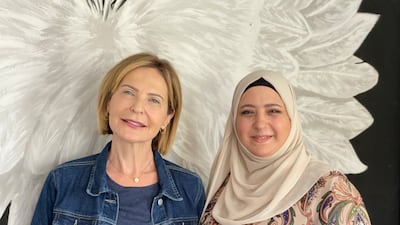Roula Al Ajeh was living a comfortable life in Dubai, working as deputy director of a private school, when the uprising against Syrian President Bashar Al Assad broke out in her homeland in 2011.
As the authorities used violence to crush the protest movement and people throughout Syria fled their homes, she started collecting and sending clothes to the displaced, most of whom ended up in the countryside in the north-west of the country.
Dozens of fellow Syrians would turn up at her home to help her pack boxes "after I'd barely finished typing a message for help on WhatsApp", Ms Al Ajeh says.
It was the beginning of a humanitarian career that took her for the first time to rural fringes of her homeland, and eventually to Amman, where she has set up a learning centre for the needy that has attracted Jordanian and Syrian students.
Ms Al Ajeh, from an established family in Damascus, is one of thousands of Syrian all over the world moved by the plight of the victims of their country's conflict.
They are mainly city dwellers who previously had little interaction with their generally more conservative rural compatriots, who constituted the core of the protest movement in 2011 and the ensuing armed uprising against Mr Al Assad.
Between 2012 and 2013 Ms Al Ajeh frequently travelled to rebel areas in the governorates of Aleppo and Idlib, where she set up two schools and a system of classes in tents, to try to avoid student deaths from the regime's bombing of fixed infrastructure.
"It was also easier to convince the parents to let their daughters attend classes, because the tents were near their homes," she says.
She had to stop working in the north-west because of advances by the regime and extremist militants who had all but eliminated the moderate armed opposition to Mr Al Assad.
Ms Al Ajeh then focused her efforts on Jordan, home to 670,000 registered Syrian refugees. She helped to provide education to children at the Zaatari camp in the north and university scholarships to Syrian students, funded with her own money as well as from donations.
In 2015, she founded Bareeq, a learning centre housed in a building in Hay Nazzal, a low-income neighbourhood in east Amman.
More than half of its 475 students are Jordanians attracted by the quality of the courses, such as English and mathematics, which help to improve their performance at public schools.
“The accents are so mixed that you cannot tell who is Jordanian and who is Syrian,” Ms Al Ajeh says.
The centre also offers lessons in karate, self-defence for girls, first aid and music, and courses for children with special needs, as well as vocational training for parents.
“My dream is to form a Bareeq corale,” Ms Ajeh says.

The centre's activities are funded by international organisations, as well as Syrians with a long history in Jordan.
Among them are thousands of families who fled Jordan in the 1980s, after Hafez Al Assad put down another rural-based uprising against Assad family rule. They include descendants of Syrians who came to Jordan in the 1920s, when the kingdom was set up as a British protectorate, and who played an important role in the development of the Jordanian economy and society.
Fadia, a Jordanian, was at the centre this week, waiting for her daughter to finish a special needs class.
“At the public school, teachers just ignored her,” she says. "Here she is a changed person and her reading and writing has improved sharply."
The Syrian children who go to the centre are mostly from Syria's rural areas. Some of their families came to Jordan on foot, before Jordanian authorities shut the border to refugees in 2014.
Leen, the director of the Bareeq, is from the southern governorate of Deraa, the birthplace of the uprising. She started by teaching English at the centre after receiving one its scholarships, which allowed her to finish her degree in English literature at the Isra University in Amman.
Uday, a 15-year-old from rural Aleppo, is taking catch-up classes and hopes to obtain Jordanian education ministry approval to register in regular school.
“I want to be able to make it to university,” he says.


